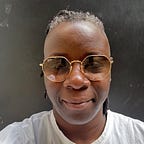Productizing Blackness
The death of George Floyd ignited a surge of companies publicly pledging to right the wrongs of systemic racism within their own culture and processes. And while a simple Google search now yields countless articles conceptualizing those efforts, the overwhelming reaction from business leaders is a hustle for Black talent.
The sweeping effect of this awakening is a rush for businesses to show the world that they have Black people on their teams and in their leadership. As I like to put it; Black people are in style now in corporate America.
Over the last couple of months, I’ve been noticing an influx of meeting invites sent to me and my colleagues with very little context regarding our role. The more meetings we attended where the purpose of our presence was completely unclear, the deeper we were led to one conclusion: we had been invited for our Blackness and not our expertise.
Twelve years ago, The Harvard Business Review published an article entitled “Dear White Boss…,” a fictional letter from a Black manager to an anonymous white executive. The article was based on interviews, research, and collaboration with Black leaders and their personal experiences, using a personal perspective to describe the debilitating challenges of racial inequity for employees of color and their organizations as a whole.
In one part of the letter, the writer describes a management team visit where she was bombarded by diversity-related questions — none related to her actual strategic planning expertise. He writes, “the executive team saw me not as a seasoned strategist but as an authority on race relations.” This fictional experience largely mirrored some of my own with the unfortunate reality that not much has changed since the publication of that letter. But what’s more compounded, is that what my colleagues and I are experiencing today is in an honest effort to be a solution to the issues.
So the question now is: Is the motivation overshadowing the intention?
If a company’s efforts in reaction to current events are based on the need to stay current, and not the benefit of its individuals, then are we doing our team any justice?
In the Harvard Business Review’s recent follow-up, What Has and Hasn’t Changed Since ‘Dear White Boss’, there’s mention that organizations have since failed to “walk the talk” in regard to delivering on long-held promises to further diversity and inclusion. But there’s a distinct difference between diversity and inclusion, which seems to be more convoluted than ever…
Having a seat at the table can’t just be a nice gesture.
Contributing to the decision-making process shouldn’t be based on skin color or quotas.
But in this moment in history, we have two choices as Black people; to participate in the change or deal with racism. For me, as a senior leader in an organization trying to right the systemic wrongs, I can’t waste my proximity to power. I have to decide that I’m going to help clear the way for other people who look like me.
So I go into the meeting room, and I take the position as the fairness police. I’m senior enough to take the risk, and I’m able to say the things that the younger folks can’t say because they stand to lose more than I do. As a result, I have to set the terms of engagement without speaking on behalf of the race; all while doing the actual job that I get paid to do.
It’s entirely exhausting, but it’s the work, and I’m committed to it.
As for organizations seeking the change that’s now trending in our country, it starts with a renewed perspective on inclusivity and a focus on the future — not the right now. It’s basing leadership and employee assessment on potential, not past performance. It’s acknowledging the challenges that your Black and brown team members have endured. It’s doing the research to better understand racist events and offering opportunities to reflect, converse, and grow. And it’s exhibiting full transparency across every internal process and meeting invite for every employee.
